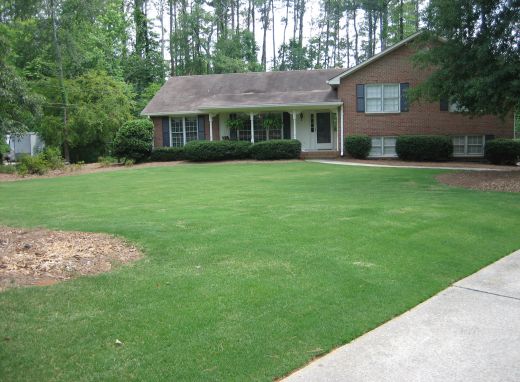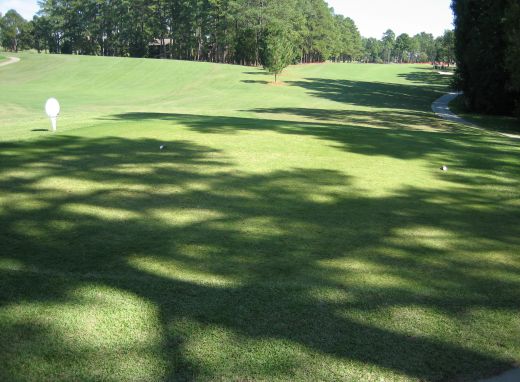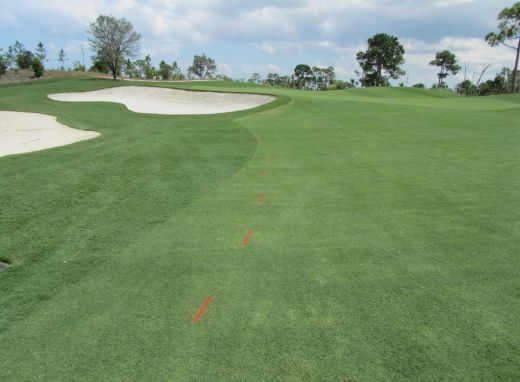At a Glance
TifGrand is a semi-dwarf Bermuda grass that is naturally darker green and produces thin blade and denser turf than other Tifdwarf and semi-dwarf varieties. TifGrand was bred to withstand multiple environmental stresses such as shade and heavy traffic.
TifGrand has outscored Tifway, TifSport, TifGreen and Tifdwarf in heavily shaded areas of up to 60 percent continuous shade, after which it begins to thin. However, even above 60 percent shade, TifGrand produces enough sod to control erosion and green up areas where before other grasses would not grow, making it a good choice for golf courses with shaded rough, greens or teeboxes, athletic fields affected by shade, and heavily-treed landscapes such as lawns and packs.
TifGrand bermudagrass spreads by rhizomes and stolons, producing a very dense, attractive, weed-resistant turf that holds up to heavy traffic, outperforming Tifway and other grasses in multiple field tests. Its narrow blade results in significantly less morning dew, and it requires less nitrogen and water than Tifway and TifSport.
Cultivation
TifGrand is not overly aggressive and tends to stay where planted due to its semi-dwarf nature. It can be overseeded with perennial ryegrass and ryegrass blends.
This variety is only reproduced vegetatively and is available for sale only as sod, plugs or sprigs. Sod is recommended rather than sprigs in shaded areas to ensure successful establishment of the stand, especially where there is tree root competition.
TifGrand performs best when it receives approximately 1 inch of water per week. Water only to supplement rainfall shortages, and avoid fixed timer irrigation settings.
Mowing
Mow one to three times per week, maintaining a cutting height of ½ to 2 inches. Be sure not to remove more than a third of the plant at each mowing. TifGrand’s vigorous growth can retard weed infestation, but use of a pre-emergent herbicide specifically labeled for bermudagrasses is recommended in spring and fall.
Development
Released by University of Georgia turfgrass breeders and geneticists Dr. Wayne Hanna and Dr. Kris Braman, TifGrand bermudagrass is patented and licensed exclusively to New Concepts Turf and sublicensees for production.
Breeder

Dr. Wayne Hanna
In his turfgrass breeding program at the University of Georgia, Dr. Wayne W. Hanna focuses on developing seed- and pollen-sterile, low-maintenance cultivars with drought and pest tolerance.
He has developed popular forage cultivars such as Tifleaf 2 and Tifleaf 3 pearl millet, Grazer annual rye grass, TifQuik bahia grass, and Mott dwarf elephant grass. He has also developed commercial turfgrass cultivars including Tifton 10, TifSport, TifEagle and TifGrand Bermuda grasses and TifBlair centipedegrass. More recently he has released purplish/red ornamental Pennisetum hybrids (Prince, Princess, Princess Caroline, Princess Molly, Vertigo, First Knight, Tift 11, Tift 15, Tift 26, Tift 40 and Tift 118) and an ornamental perennial peanut, Cowboy.
Dr. Hanna’s research currently focuses on producing seed- and pollen-sterile ornamental grass cultivars (Miscanthus spp., Lovegrass, Rubygrass, Little Blue Stem, Pennisetum alopecuroides, P. hohenackeri, and P. orientale) and on coneless/pollenless pine trees (loblolly and slash) as well as seedless cultivars of cold-tolerant citrus (tangerine, lemon and grapefruit), a variegated Chinaberry tree, and pomegranate.
Dr. Hanna was an Assistant Professor at the University of Florida (Gainesville) from 1970 to 1971. He joined the USDA Agricultural Research Service at Tifton, Ga., in 1971, where he worked cooperatively with the University of Georgia until 2003. Since then, he has been a part-time Professor with the University of Georgia.
He received his B.S. degree in Agricultural Education, M.S. degree in Plant Breeding and Ph.D. degree in Genetics, all at Texas A&M University.



